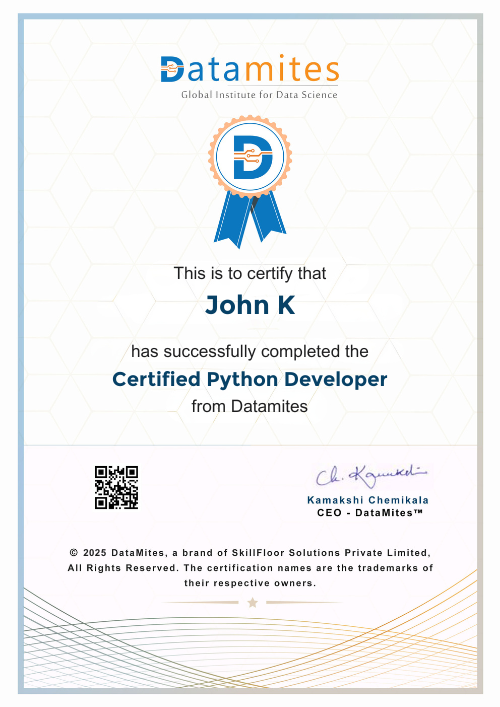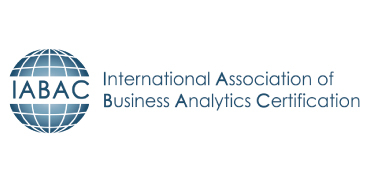Instructor Led Live Online
Self Learning + Live Mentoring
Customize Your Training

• Introduction of python
• Installation of Python and IDE
• Python Variables
• Python basic data types
• Number & Booleans, strings
• Arithmetic Operators
• Comparison Operators
• Assignment Operators
• IF Conditional statement
• IF-ELSE
• NESTED IF
• Python Loops basics
• WHILE Statement
• FOR statements
• BREAK and CONTINUE statements
• Basic data structure in python
• Basics of List
• List: Object, methods
• Tuple: Object, methods
• Sets: Object, methods
• Dictionary: Object, methods
• Functions basics
• Function Parameter passing
• Lambda functions
• Map, reduce, filter functions
• Decorators
• Generators
• Context Managers
• Metaclasses
• Inheritance and Polymorphism
• Encapsulation and Abstraction
• Class methods and static methods
• Special (magic/dunder) methods
• Property decorators - getters, setters, and deletes
• Working with files
• Reading and writing files
• Buffered read and write
• Other file methods
• Logging & Debugger
• Modules and import statements
• SQL Basics
• Creating DB Table
• INSERT, READ, UPDATE, DELETE
• Introduction to MongoDB
• CRUD operations in MongoDB
• namedtuple(), deque, ChainMap,
• Counter, OrderedDict, defaultdict,
• UserDict, UserList, UserString
• Exceptions handling with try-except
• Custom exception handling
• List of general use exception
• Best practice exception handling
• Generators, Iterators
• The Functions any and all
• With Statement
• Data Compression
• A Daytime Server
• Clients and Servers
• The Client and Server Programs
• Classes and Threads
• Multi-threading; thread life cycle
• Regular Expression Syntax
• Group, Split and wildcards
• Quantifiers
• Match, Search and Find all methods
• Character Sequence
• Introduction to OpenCV, Installation
• Basic Operations on Images
• Image Filtering
• Image Classification
• Introduction to GIT
• Basic Git commands
• Introduction to Flask and Installation
• Creating project
• Routing,templates, forms and database integration
• Deployment on render
• Django Introduction and Installation
• Creating a Project
• Django Architecture and File Structure
• Folder Structure, First Django project
• Database and Views, Static Files and Forms
• URL Mapping and Routing
• Defining Models and Relationships
• Database Migrations and Schema Changes
• Querying Data using Django ORM
• Model Forms and Form Validation
• HTML Forms in Django
• Model Forms and Form Validation
• Formsets and Inline Formsets
• File Uploads and Validation
• Deploying Django Applications
• Hosting Options (e.g., Heroku, AWS)
• Project Showcasing and Review
Python stands out as a versatile high-level programming language celebrated for its simplicity and adaptability.
Setting up Python involves downloading the installer from the official Python website and following the installation prompts.
The favorability between Python and Java varies depending on context; Python is favoured for its simplicity and learning ease, while Java shines for its performance and scalability in enterprise settings.
Python 2 has ceased development and support, while Python 3 remains actively maintained, boasting syntax enhancements and additional features.
Beginners can effectively learn Python through online tutorials, interactive coding platforms, books, and engaging with coding communities.
Python proves invaluable in data science through libraries like Pandas, NumPy, and scikit-learn, facilitating tasks such as data manipulation, analysis, and machine learning.
Python frameworks offer pre-written code and libraries to streamline development tasks within specific domains, such as web development (e.g., Django, Flask) or GUI applications (e.g., Tkinter).
Debugging Python code can be accomplished through techniques like utilizing print statements, employing debugging tools such as PDB or IDE debuggers, and methodically analyzing error messages.
Python is more versatile, serving a broader range of applications, while R specializes in statistical analysis with richer packages tailored for that purpose.
In Belgrade, the demand for Python developers has been steadily rising, propelled by Python's popularity in web development, data science, and automation realms.
Employers seek Python developers proficient in core Python concepts, adept at problem-solving, experienced with frameworks/libraries, and capable of crafting efficient, maintainable code.
While Python certifications can validate skills, practical experience and projects often carry more weight in employers' eyes.
Crafting a compelling resume involves highlighting relevant Python projects, showcasing problem-solving prowess, and emphasizing specific technical skills and achievements.
Preparing for Python developer interviews entails reviewing algorithms, practicing coding challenges, and demonstrating a clear understanding of Python concepts and best practices.
A formal degree is not always requisite for a Python development career; practical skills and experience can often outweigh academic qualifications.
The primary duties of a Python developer encompass application development, algorithm implementation, issue troubleshooting, and collaborative teamwork.
Transitioning into a Python developer role involves acquiring relevant skills through online courses, bootcamps, or self-study, building a project portfolio, and networking within the industry.
Python finds extensive application in data science for tasks such as data manipulation, analysis, visualization, machine learning, and statistical modeling.
Python is utilized in artificial intelligence for natural language processing, computer vision, machine learning algorithms, and neural network development.
Companies like Google, Facebook, Amazon, and Netflix extensively utilize Python across their operations, employing it for web development, data analysis, automation, and machine learning endeavours.
The salary of a Python Course in Belgrade ranges from RSD 180,000 per year according to a Glassdoor report.
DataMites is highly recommended for Python training in Belgrade due to its comprehensive curriculum, experienced instructors, and adaptable teaching methods. Whether you're a beginner or looking to advance your Python skills, DataMites offers practical learning through hands-on projects and dedicated placement support to enhance your career prospects.
Choosing DataMites for Python training in Belgrade means immersing yourself in a program designed to master a versatile programming language, tailored to industry requirements. The emphasis on practical, hands-on learning ensures you gain relevant skills to excel in the field.
The Python developer course in Belgrade spans four months, consisting of 20 hours of live online sessions and supplemented by 400 hours of self-paced learning.
Python developer training in Belgrade by DataMites is open to individuals from various educational backgrounds, including graduates, postgraduates, and high school graduates. The program is beginner-friendly, focusing on building a strong foundation in Python fundamentals.
DataMites offers a Flexi-Pass option for Python training, granting participants a three-month window to access training sessions. This flexibility allows individuals to address queries, review material, and attend additional sessions as needed to meet their learning objectives.
The DataMites Certified Python Developer course offers comprehensive training covering basic to advanced Python topics, equipping learners with proficient Python skills.
The Python for Data Science course caters to individuals with varying levels of programming expertise, covering essential concepts such as data manipulation, machine learning algorithms, and programming techniques crucial for data analysis, irrespective of prior experience.
The Data Mining with Python course focuses on extracting insights from large datasets to drive future predictions, a crucial aspect of Data Science requiring diverse skills and knowledge to analyze data effectively.
The Python for Machine Learning Course provided by DataMites in Belgrade offers a comprehensive introduction to Python tailored for machine learning applications. Participants learn various machine learning algorithms and their practical implementation using Python, particularly leveraging the Scikit-Learn package.
The Deep Learning with Python Course explores deep learning concepts using Python and the Keras library, covering theoretical principles and practical applications in areas like computer vision, natural language processing, and generative models.
DataMites offers Python training fees in Belgrade ranging from RSD 18,683 to RSD 47,207.
Yes, DataMites offers Python courses in Belgrade with internship opportunities, allowing participants to gain real-world experience and apply their Python skills in professional settings, enhancing their employability.
Upon completion of Python classes in Belgrade with DataMites, participants receive the prestigious IABAC® certification, globally recognized for validating proficiency in Python programming.
Participants are required to bring valid photo identification, such as a National ID card or driver's license, to Python training sessions in Belgrade.
Yes, DataMites provides project opportunities as part of Python training in Belgrade, including 10 capstone projects and 1 client project, allowing participants to apply their Python skills in practical scenarios.
Participants who miss Python training sessions in Belgrade can access recorded sessions and course materials online through DataMites' platform. Additionally, makeup sessions can be arranged to ensure continuous learning progress.
Tools covered in Python developer training in Belgrade by DataMites include Anaconda, Python, PyCharm, Flask, NumPy, Pandas, and Google Colab.
Yes, participants can attend a complimentary demo class to get a preview of the training and understand what to expect throughout the course.
Career mentoring sessions hosted by DataMites Placement Assistance Team (PAT) guide participants on career possibilities in Data Science, addressing challenges and providing strategies for success in the corporate world.
Yes, DataMites offers help sessions to better understand specific Python topics, ensuring participants grasp concepts effectively.
Various payment options, including cash, credit card, net banking, check, debit card, and PayPal, are accepted for DataMites Python courses in Belgrade.
The DataMites Placement Assistance Team(PAT) facilitates the aspirants in taking all the necessary steps in starting their career in Data Science. Some of the services provided by PAT are: -
The DataMites Placement Assistance Team(PAT) conducts sessions on career mentoring for the aspirants with a view of helping them realize the purpose they have to serve when they step into the corporate world. The students are guided by industry experts about the various possibilities in the Data Science career, this will help the aspirants to draw a clear picture of the career options available. Also, they will be made knowledgeable about the various obstacles they are likely to face as a fresher in the field, and how they can tackle.
No, PAT does not promise a job, but it helps the aspirants to build the required potential needed in landing a career. The aspirants can capitalize on the acquired skills, in the long run, to a successful career in Data Science.



